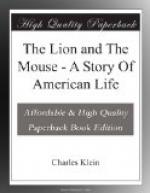Yes, it was true, he thought, the foreigner had indeed learned the secret of enjoying life. There was assuredly something else in the world beyond mere money-getting. His father was a slave to it, but he would never be. He was resolved on that. Yet, with all his ideas of emancipation and progress, Jefferson was a thoroughly practical young man. He fully understood the value of money, and the possession of it was as sweet to him as to other men. Only he would never soil his soul in acquiring it dishonourably. He was convinced that society as at present organized was all wrong and that the feudalism of the middle ages had simply given place to a worse form of slavery—capitalistic driven labour—which had resulted in the actual iniquitous conditions, the enriching of the rich and the impoverishment of the poor. He was familiar with the socialistic doctrines of the day and had taken a keen interest in this momentous question, this dream of a regenerated mankind. He had read Karl Marx and other socialistic writers, and while his essentially practical mind could hardly approve all their programme for reorganizing the State, some of which seemed to him utopian, extravagant and even undesirable, he realised that the socialistic movement was growing rapidly all over the world and the day was not far distant when in America, as to-day in Germany and France, it would be a formidable factor to reckon with.
But until the socialistic millennium arrived and society was reorganized, money, he admitted, would remain the lever of the world, the great stimulus to effort. Money supplied not only the necessities of life but also its luxuries, everything the material desire craved for, and so long as money had this magic purchasing power, so long would men lie and cheat and rob and kill for its possession. Was life worth living without money? Could one travel and enjoy the glorious spectacles Nature affords—the rolling ocean, the majestic mountains, the beautiful lakes, the noble rivers—without money? Could the book-lover buy books, the art-lover purchase pictures? Could one have fine houses to live in, or all sorts of modern conveniences to add to one’s comfort, without money? The philosophers declared contentment to be happiness, arguing that the hod-carrier was likely to be happier in his hut than the millionaire in his palace; but was not that mere animal contentment, the happiness which knows no higher state, the ignorance of one whose eyes have never been raised to the heights?
No, Jefferson was no fool. He loved money for what pleasure, intellectual or physical, it could give him, but he would never allow money to dominate his life as his father had done. His father, he knew well, was not a happy man, neither happy himself nor respected by the world. He had toiled all his life to make his vast fortune and now he toiled to take care of it. The galley slave led a life of luxurious ease compared with John Burkett Ryder. Baited by the yellow newspapers and magazines, investigated by State committees, dogged by process-servers, haunted by beggars, harassed by blackmailers, threatened by kidnappers, frustrated in his attempts to bestow charity by the cry “tainted money”—certainly the lot of the world’s richest man was far from being an enviable one.




